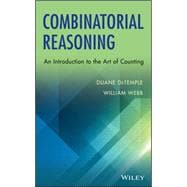Written by two well-known scholars in the field, Combinatorial Reasoning: An Introduction to the Art of Counting presents a clear and comprehensive introduction to the concepts and methodology of beginning combinatorics. Focusing on modern techniques and applications, the book develops a variety of effective approaches to solving counting problems.
Balancing abstract ideas with specific topical coverage, the book utilizes real world examples with problems ranging from basic calculations that are designed to develop fundamental concepts to more challenging exercises that allow for a deeper exploration of complex combinatorial situations. Simple cases are treated first before moving on to general and more advanced cases. Additional features of the book include:
• Approximately 700 carefully structured problems designed for readers at multiple levels, many with hints and/or short answers
• Numerous examples that illustrate problem solving using both combinatorial reasoning and sophisticated algorithmic methods
• A novel approach to the study of recurrence sequences, which simplifies many proofs and calculations
• Concrete examples and diagrams interspersed throughout to further aid comprehension of abstract concepts
• A chapter-by-chapter review to clarify the most crucial concepts covered
Combinatorial Reasoning: An Introduction to the Art of Counting is an excellent textbook for upper-undergraduate and beginning graduate-level courses on introductory combinatorics and discrete mathematics.








